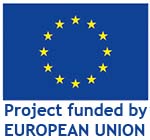


 |
 |
 |
BATTI was established in 2014 with the idea to create regional community of innovation support and technology professionals, to promote high standards in the provision of innovation support and technology transfer services to SMEs, NGOs, public sector, universities, etc. and to share professional experience and good practice, with a view to developing the knowledge economy and improving the quality of life in Varna and Bulgaria, in general.
BATTI is a non-profit organization with head office in Varna and branches in Sofia, Burgas, Ruse and Blagoevgrad. BATTI’s team has extensive and varied in-depth experience in the preparation, implementation, monitoring, reporting and dissemination of results in more than 60 national, regional and international projects, both as a lead organization and as a partner. BATTI is one of the largest Bulgarian associations promoting or providing high quality innovation support and technology transfer services to SMEs, NGOs, public sector, universities, etc with the aim to develop the knowledge economy and boost the wealth creation process.
BATTI provides established contacts, networks, resources through more than 400 partners in the country and experience necessary to involve different target groups. The NGO brings together actors and stakeholders, people, communities and economies of the Romania - Bulgaria, Serbia-Bulgaria, FYROM-Bulgaria, Greece-Bulgaria, Turkiye-Bulgaria cross border regions to facilitate learning, exchange of experience, to participate in the joint development of a cooperative area, using its human, natural and environmental resources and advantages in a sustainable way. BATTI participates in international projects in the cross border programmes, the Black Sea and the Danube programmes to provide fora for exchange of information and best practices, transfer of experience with an emphasis on modern technology, e-business, web-based solutions, SME support, education, life-long learning, international cooperation and social dialogue, ecology, youth, cultural exchange, tourism, cross border cooperation programs, etc.
Official website - www.batti.eu
Project activities and results
Activity M.2 – Monitoring and assessment
Monitoring and assessment of the project will be carried out using the following instruments: work meetings with the project team members to permanently analyze the ongoing implementation stages (elaboration and submission of activity reports, used working tools, encountered difficulties, proposed solutions, etc.) and discussions among the project team members in order to identify potential problems encountered during implementation of activities (analysis of the degree of progress according to the work plan, analysis of compliance with the quantitative and qualitative parameters of the investment, framing the established budget, etc.).
Activity T.1.1 - Acquisition of the monitoring system of environment by partners from Romania, Moldova and Bulgaria
All partners involved in the project will purchase a multi-agent monitoring environmental station in order to provide information about emission levels using remote monitoring and reporting of noise, dust and vibration and, thus, obtain an overall view of the actual situation of the environmental parameters in the partner countries and thus in Black Sea Basin area.
Results:
Activity T2.4 – Creation of a web based platform and a mobile application
BATTI will implement an innovative technology web solution for rapid response to crisis situations, simultaneous registration, allocation and pooling of volunteer groups, trainings and demonstrations to deal with unforeseen accidents or disasters will be created. The innovative platform will provide comprehensive information on the actions of institutions and emergency groups. The app will give direct access and emergency alert to medical groups, teams etc.
Results:
Activity T3.1 Acquisition of external services for environmental management plan
The management plan will indicate the details as to how various measures have been or are proposed to be taken. The management plan should provide considerations on resources conservation and pollution mitigation, related to: air pollution, solid wastes, noise and vibrations, prevention maintenance and operation or environment monitoring system, transport system, disaster planning, environment management. By using the collected data from the integrated monitoring environmental monitoring system, the management plan will analyze and propose the necessary measures in order to protect the environment.
Results:
Activity T3.2 Research on the risks, hazards, vulnerabilities of transport networks in the Bulgarian Black Sea coast
In order to make a qualitative assessment of the risks and vulnerability of transport networks and logistics channels in the planned coastal area of the project, it is necessary to raise questions about the current state of the networks, how they mediate or hinder the response to disasters and accidents and whether they influence the environment in any way. In this connection, meetings with institutions in both regions - Varna and Burgas - are needed to provide quantitative and qualitative data, availability of equipment and methods and techniques for hazard investigation. Statistics will be sought, supported by reports and trends for detailed analysis of transport systems and networks on the Bulgarian Black Sea coast (Varna and Burgas region).
Results:
Activity T3.3 Analysis on the type of the risks, hazards and natural disasters in the Bulgarian Black Sea coast
The purpose of the activity is to structure the data obtained from T3.2 and to start with an analysis comprising different directions and reference points - on the one hand to check and analyze each type of registration risks, to outline and to systemize the hazards and natural disasters on the Bulgarian Black Sea coast (Varna and Burgas) compared to their intensity, scale and probability of occurrence, by number of victims based on statistical data, public data and official register of state institutions. Particular attention will be paid to the analysis of the various types of disasters typical of the Bulgarian Black Sea coast, which will provide a preliminary picture of the state of natural phenomena such as ice storms, strong winds, thunderstorms, landslides, chemical poisoning, industrial accidents, floods, fires, currents, epidemics and others.
Results:
Activity T3.4 Identification and analysis for the possibility of their implementation in the Black Sea region of at least 20 already existing innovative best practices in the disaster prevention and planning from at least 5 leading countries in that sphere
A detailed identification and subsequent analysis of the feasibility of their implementation in the Black Sea region of at least 20 already existing innovative best practices in disaster prevention and planning of at least 5 leading countries in this area will be carried out. A rigorous study of good European and global practices for preventive measures taken in natural landscape research, characterized by certain features and inclinations of the various natural disasters, will explore systems and programs for adequate action to deal with accidents and disasters, preserving natural resources. The main benefits of the study will be to bring together innovative technologies or technical means to deal with environmental disasters and accidents in the Black Sea region that would be applicable to different partners in different stages so that everyone can borrow and adapt innovation in the future Region.
Results:
Activity T3.5 Identification and analysis for the possibility of their implementation in the Black Sea region of at least 10 innovative best practices that have already not been implemented in the disaster prevention and planning from at least 5 leading countries
This activity refers to the identification and analysis of the possibility of their implementation in the Black Sea region of at least 10 innovative best practices that have not already been applied in the prevention and disaster planning of at least 5 leading countries in the field. The analysis of already applied good practices will provide basic conclusions, under what conditions should they be applied, whether they are environmentally friendly, adaptable and financially for the partners, and require significant investment to be fully implemented. The analysis will, on the other hand, provide information on developed innovations - technological or product - which, for one reason or another, have not been introduced at the prototyping stage but can be somewhat upgraded and adapted to the conditions of the Black Sea Basin region.
Results:
Activity T3.6 Organizing of ten training seminars and simulated exercises for personnel of relevant entities and pool of volunteers in case of disasters on the use of decision support systems and new technologies
In order to achieve a united public opinion on participation in disaster and accident assistance programs, a common civic position in environmental protection and sustainable self-awareness for participation in civic initiatives at different levels, it is necessary to organize periodic training seminars for civil protection in which to participate wide range of people interested parties, on the other hand - will serve as an opportunity to train volunteers willing to be actively involved, but lack the necessary competence and skills for this. A training plan will be organized with trainers, presenters and lecturers qualified to conduct training modules through a theoretical part and related simulated exercises for company staff of organizations and teams of volunteers in case of disasters and accidents. The training plan will include methods for the use of alarm systems relief and new technologies to improve their capacity for improved planning and operations before, during and after environmental disaster events or other accidents.
Results:
Activity T3.7 Research and analysis on the current capacity of Black Sea Municipalities in Varna and Burgas to the current equipment, emergency reaction possibilities, trained stuff, procedures and identification of weaknesses in technical and human resources
This activity refers to the exploration of the current capacity of the Black Sea municipalities in Varna and Burgas regarding the current equipment, emergency response capabilities, trained people, procedures and identification of the weaknesses in the technical and human resources. The study aims to identify the gaps in the built-up response system in both municipalities, as well as to identify modern trends suitable for adaptation in Bulgaria. Meetings with representatives of institutions and organizations for disasters and accidents will be organized, discussions on the current status of the emergency groups by regions and smaller municipalities will be organized, and meetings will be organized to identify needs for new facilities, equipment, its capacity for use and territorial coverage. A strategy for successive measures and an action plan for each of the municipalities will be drawn up with a view to improving the status for the next 10 years as well as to protecting the environment.
Results:
Activity C.1 Communication start-up activities
BATTI has distributed the press release in the local media. The press release observed the stipulations and template of the Communication and Visibility Manual of the Programme, with the specific mentioning that the funding was provided by the European Union, with the amount in both euro and local currency.
Results:
Activity C.2 Public events
The activity aims at summarizing the indicators achieved and their official presentation to partners and interested institutions. The activity includes: - organizing a 1-day conference to present the results of the surveys for at least 40 participants; - 5 mobile demonstration demos and the web based platform - 5 volunteer training sessions and community representatives to help with emergency aid - Emergency Disaster and Emergency Response Course.
Results:
Common borders. Common solutions.
